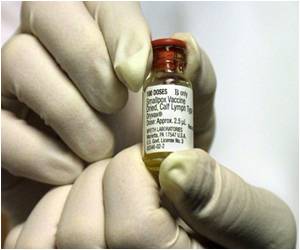The virus that causes smallpox -Variola- is on the agenda of the upcoming meeting of the World Health Assembly (WHA), the governing body of the World Health Organization (WHO).

Smallpox was declared eradicated in 1980, the only human pathogen for which successful eradication has been achieved to date. Since then, limited research focusing on diagnostic, antiviral and vaccine development, under close direction and oversight, has continued in two high-security laboratories--one in Russia and one in the US--the only places that are known still to have live variola strains. The justification for this research is that smallpox might re-appear via intentional release. Indeed, recent advances in synthetic biology make the possibility of re-creating the live virus from scratch more plausible.
Summarizing the focus and the achievements of the research on live variola over the past several decades, the authors of the PLOS Pathogens article mention several new smallpox vaccines (the ones widely used prior to eradication would not meet today's stricter safety standards for routine use) and two new drug candidates that, based on research so far, appear to be promising antivirals against the virus that causes smallpox. However, both of these drug candidates have not yet been licensed for use against the disease. "Despite these considerable advances, they argue that "the research agenda with live variola virus is not yet finished".
Discussing the significant remaining knowledge gaps, they highlight that while "variola is unusual in that it is known to be a sole human pathogen, the viral and host factors responsible for this human-specific tropism remain essentially unknown to this day" and argue that "greater exploitation of current technologies may lead to additional therapeutic or diagnostic products to better respond to any future emergency situation resulting from a smallpox appearance." In light of published variola genome sequences and current capabilities of synthetic biology, they also question whether the ultimate destruction of the variola virus is actually feasible or meaningful.
Overall, the authors conclude that research on live variola "remains vital" and "the original goals of the WHO agenda for newer and safer vaccines, fully licensed antiviral drugs, and better diagnostics have still not been fully met".
Source-Eurekalert









